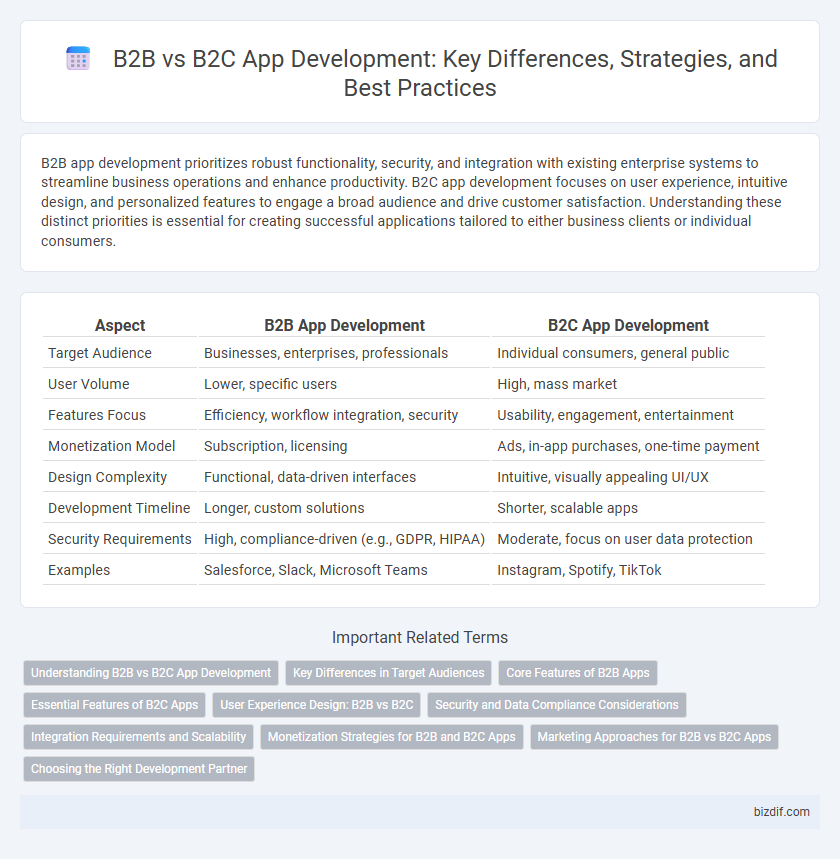B2B app development prioritizes robust functionality, security, and integration with existing enterprise systems to streamline business operations and enhance productivity. B2C app development focuses on user experience, intuitive design, and personalized features to engage a broad audience and drive customer satisfaction. Understanding these distinct priorities is essential for creating successful applications tailored to either business clients or individual consumers.
Table of Comparison
| Aspect | B2B App Development | B2C App Development |
|---|---|---|
| Target Audience | Businesses, enterprises, professionals | Individual consumers, general public |
| User Volume | Lower, specific users | High, mass market |
| Features Focus | Efficiency, workflow integration, security | Usability, engagement, entertainment |
| Monetization Model | Subscription, licensing | Ads, in-app purchases, one-time payment |
| Design Complexity | Functional, data-driven interfaces | Intuitive, visually appealing UI/UX |
| Development Timeline | Longer, custom solutions | Shorter, scalable apps |
| Security Requirements | High, compliance-driven (e.g., GDPR, HIPAA) | Moderate, focus on user data protection |
| Examples | Salesforce, Slack, Microsoft Teams | Instagram, Spotify, TikTok |
Understanding B2B vs B2C App Development
B2B app development focuses on creating solutions that improve business processes, enhance collaboration, and streamline workflows for enterprise clients, often requiring robust security and integration capabilities. B2C app development targets individual consumers with intuitive, user-friendly interfaces designed to maximize engagement, personalization, and customer retention. Understanding the distinct user needs, technical requirements, and market dynamics between B2B and B2C apps is critical for delivering tailored digital experiences that drive value and growth.
Key Differences in Target Audiences
B2B app development targets businesses and professionals requiring tools for workflow optimization, collaboration, and data management, often emphasizing security and integration with enterprise systems. B2C app development focuses on engaging individual consumers through intuitive interfaces, personalization, and seamless user experiences to drive higher user retention and satisfaction. Understanding these key differences in target audiences shapes the app's design, functionality, and marketing strategies to meet specific user needs effectively.
Core Features of B2B Apps
B2B app development focuses on core features like advanced user roles and permissions, seamless integration with enterprise software, and robust security protocols to support business operations. These apps prioritize scalability, data analytics, and workflow automation to enhance productivity and collaboration between organizations. Customizable interfaces and multi-tiered access control are essential for managing complex business processes in B2B environments.
Essential Features of B2C Apps
B2C app development prioritizes essential features such as seamless user experience, intuitive navigation, personalized content, and secure payment integration to cater to a broad consumer base. High emphasis is placed on scalability, real-time notifications, and social media integration to enhance user engagement and retention. Data analytics and user behavior tracking are crucial for continuously optimizing the app's performance and marketing strategies.
User Experience Design: B2B vs B2C
User Experience Design in B2B app development prioritizes efficiency, task-oriented workflows, and integrating complex functionalities to support professional users managing business processes. In contrast, B2C app development emphasizes intuitive navigation, engaging visuals, and emotional appeal to attract and retain individual consumers with simpler interaction models. Tailoring UX strategies to these distinct user needs enhances satisfaction and drives adoption in both B2B and B2C markets.
Security and Data Compliance Considerations
B2B app development prioritizes robust security measures such as multi-factor authentication, role-based access control, and strict encryption protocols due to the sensitive nature of corporate data and regulatory compliance like GDPR and HIPAA. B2C app development emphasizes user privacy, secure payment processing, and compliance with data protection laws like CCPA, focusing on safeguarding personal information and preventing fraud. Both B2B and B2C apps require continuous security updates and auditing to ensure data integrity and protect against evolving cyber threats.
Integration Requirements and Scalability
B2B app development demands extensive integration with existing enterprise systems such as CRM, ERP, and supply chain management platforms to ensure seamless data exchange and workflow automation. Scalability in B2B apps often targets handling complex transactions and multiple user roles within large organizations, requiring robust backend infrastructure. In contrast, B2C apps prioritize scalability to accommodate rapid user growth and high traffic volumes while integrating primarily with payment gateways and social media platforms.
Monetization Strategies for B2B and B2C Apps
B2B app development monetization strategies often revolve around subscription models, tiered pricing, and enterprise licensing agreements that cater to long-term client retention and high-value contracts. In contrast, B2C apps commonly leverage freemium models, in-app purchases, and advertising to drive revenue through large user bases and frequent transactions. Tailoring monetization approaches to the target audience's purchasing behavior and app usage patterns enhances revenue potential in both B2B and B2C markets.
Marketing Approaches for B2B vs B2C Apps
B2B app development marketing strategies prioritize personalized outreach, relationship building, and demonstrating ROI through detailed case studies, targeting decision-makers within companies. In contrast, B2C app marketing emphasizes broad reach, emotional appeal, and user engagement via social media campaigns, influencer partnerships, and app store optimization. Understanding customer journeys in B2B involves longer sales cycles and multiple touchpoints, while B2C focuses on quick acquisition and retention through seamless user experiences and viral content.
Choosing the Right Development Partner
Selecting the right development partner for B2B app development requires prioritizing expertise in complex integrations, scalability, and security protocols specific to enterprise needs. In contrast, B2C app development demands a partner skilled in user experience optimization, intuitive interfaces, and rapid iteration cycles to engage a broad consumer base. Evaluating a partner's portfolio for industry-specific solutions and their ability to align with your strategic goals ensures successful app deployment and long-term business growth.
B2B app development vs B2C app development Infographic

 bizdif.com
bizdif.com